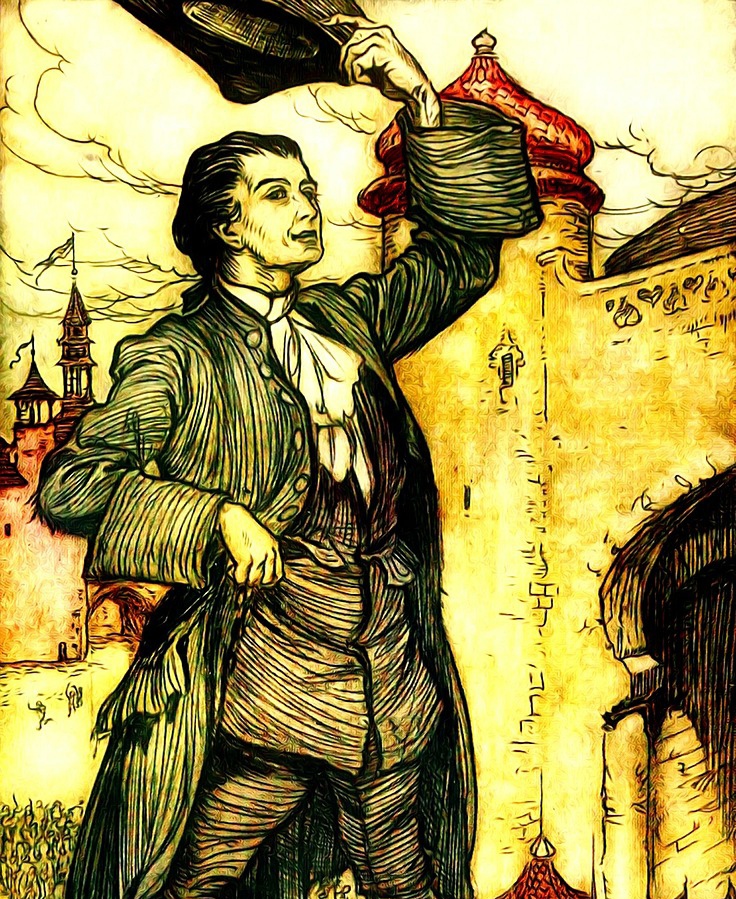
August 8th, 1726 : Benjamin Motte, a London bookseller and printer receives a letter delivered by an anonymous messenger, signed under the name of ‘Richard Sympson’. Attached to it is a portion of a manuscript with a demand for a sum of £ 2oo.
August 15th 1726 : Motte receives the outstanding part of the manuscript, “he knew not from whence, nor from whom, dropp’d at his house in the dark, from a Hackney-coach”.
Motte is later accosted by a certain Charles Ford who protests about the misprints and changes in the published book.
A certain Richard Sympson is working as a copyright holder for Sir William Temples. This Sympson, unlike the one erstwhile mentioned is a real man. The gentleman Charles Ford turned out to be a friend of Jonathan Swift.
Swift certainly had his share of foibles and eccentricities.
This manuscript, published under such mysterious circumstances would later establish itself as one of the greatest satires ever written. The fictional travel writings of a fictional Lemuel Gulliver would later have an overwhelmingly greater readership than most factual travel accounts by real travellers.
This essay deals with the discourse of Colonialism and Imperialism in Gulliver’s Travels, with special focus on its relationship with travel literature of the times. The essay analyzes the manner in which Swift deals with Colonialism and Imperialism in the form and content of his book and his critique of the two thereof.
Though aggressive colonial expansion was a phenomenon really seen only during the Second British Empire, its incipient seeds had already been planted by the late 16th century when Elizabeth I granted a patent to Humprey Gilbert for overseas exploration. Having lagged behind Spain and Portugal during the Age of Exploration, Britain missed much of the initial fruits of maritime labour that its two seafaring nations had reaped unto themselves. The aforesaid patent granted to Humprey would change the face of the British empire, thereby changing the face of the globe itself. A century later, the British Empire would not only have left the two pioneers of the Age of Exploration far behind but also secured a comfortable grasp over the various colonies by cessation of hostilities with its only significant competitor, the Dutch, after the Glorious Revolution of 1688. Again, a century later, Britain would ultimately establish itself as a world power. With an ever increasing number of voyages, expeditions, religious missions, military conquests and such like, it was only natural that a great body of literature pertaining to travel should emerge. Spanning almost five centuries, English travel literature, the body of which is derived from a plethora of sources ranging from the sailor’s logbook to the ambassador’s observations, from public journals to private notes, the contributors to this huge body hail from diverse fields : sailors, tradesmen, military officers, scientists, historians, diplomats, journalists, missionaries and many more. The influence and popularity of this genre can be fathomed by the fact that by the late eighteenth century, almost all great writers of the time from Addison to Pope, Dryden to Steele and Defoe to Johnson had, at some point or the other, tried their hand in travel literature. Defoe’s A New Voyage Round the World by a Route Never Sailed Before and A Tour thro’ the Whole Island of Great Britain have in fact been considered among the most important travel writings of the time. Moreover, it must be noted that though travel literature emerged during the First British Empire and accompanied the Second, the sheer amount of travelogues produced during the late eighteenth century is ensconced in a rich tradition whose roots can be traced back to the time before the establishment of the Empire itself. However, the seventeenth century England has been claimed to witness the Silver age of Travel and Travel Writing because the genre had not yet reached its zenith. English travel literature achieved its pinnacle in the nineteenth century, which interestingly falls under the timeline when Colonialism and Imperialism asserted themselves like never before.
Jonathan Swift is known all the world over as the author of Gulliver’s Travels, or Travels into Several Remote Nations of the World , and if one may add, particular to the Lilliput Island. This is the neat little way in which Swift is widely identified in popular culture. The massive de-politicization of Gulliver’s Travels, a text in which he perhaps most vehemently declared his politics through the synergy of its form and content often removes from sight the genius of a satirist who could make himself comfortable with the two most powerful parties of the most powerful country of the time while making himself useful as a formidable weapon in whosever hands he fell into. It is true that Swift oftentimes ran out of political favours. But it is also true that he could afford to. At least his literature could. It is interesting how a man who risks to feature in the Queen’s bad books, defects his party and has his own share of problems with the new one he joins, can still manage to brilliantly bring up the contradictions of his times in his work and be remembered for it. Swift critiques religion with the same zest with which he defends the Anglican Church. He resents being denied a suitable position in England as much as he resents England’s dominance over Ireland. However, it is also true that many of his convictions have a fine string which ties them to his own interests. In this respect, it might as well be highlighted that instead of focusing on the critique of colonialism in Gulliver’s Travels through the Whig or Tory perspective, the focus of this essay will be on the relationship of colonialism with the genre of travelogue.
The influence of non-fictional travel writings in Gulliver’s Travels is undeniable. Swift was a great reader of travelogues, a fact which is confirmed through his correspondence with many self proclaimed explorers and the collection of travel literature found in a search conducted by Harold Williams in Swift’s Library which revealed travel records of Francois Bernier, Peter Martyr, Thomas Herbert, Jan Huggen Van Linschoten, Lionel Wafer, Joseph Addison, and the great collections of Hakluyt and Purchas. That’s quite a mouthful of names right there. Furthermore, a great degree of intertextuality is seen in Gulliver’s Travels with the introductory letter itself referring to two texts, viz. Damper’s a Voyage Around the World and Thomas More‘s Utopia.
The way in which Swift uses the raw material of real travel literature to locate the contemporary issues in a fictional tale so bent on proving its veracity is truly remarkable.
As Percy Adams in his essay: A Review of Recent Approaches writes :
“ Traces of real travel should, however, be allied to the parallel tradition of travel mockery. In this vein, Lucian’s A True History, favourite reading of Swift, satirizes imaginary journeys which tell of ‘huge beasts’, ‘cruel men’, ‘strange ways of living’, citing Homer’s Odysseus as ‘their guide and instructor in this sort of charlatanry.”
Travel Literature of the Seventeenth and Eighteenth Centuries Percy Adams
Gulliver’s Travels satirizes the project of colonialism and imperialism in its content while at the same time satirizing the form of travel writing itself. After attaching the seemingly credible ‘Letter From Captain Gulliver to his Cousin Sympson’ and ‘From the Publisher to the Reader’, the four books that constitutes Gulliver’s Travels have accounts of incredible events and characters . In the letter, Swift refers to William Dampier, author of A New Voyage around the World . The satire on travel writing begins with the first letter which in itself is a parody of Dampier’s Preface to his book . First, Gulliver boasts that it was by his advice that William Dampier, author of A New Voyage around the World put the travel tales in order. Interestingly, Dampier, in his own preface to the book confesses the chapters of the book are anything but orderly. In his own words, it is a ‘”mixed relations of places and actions” for which he asks patience from the readers. Whereas Dampier vouches for the veracity of the book, Gulliver constantly points out the unreliability of his work, constantly shifting blame from his cousin Sympson who prevails upon him ”to publish a very loose and uncorrect account” of his travels, to the printer who is careless with the dates and spellings.
The first clues furnished to us by Swift by his satirizing of not just the book but even the preface of the travelogue, will help us discern his attitude towards travel writings of his times, something that manifests itself most unambiguously in the following comment by the character of Gulliver :
“ My answer was that I thought we were already overstocked with books of travels; that nothing could pass which was not extraordinary wherein I doubted some authors some author less consulted truth their own vanity, or interest , or diversion of ignorant readers”
– Gulliver’s Travels , 158
English travel literature, which started off as mere observation of new places and people by private explorers or those appointed by the government turned into a discipline with the increasing sense of the Self and moreover, the superior European Self – a viewpoint which was either severely prejudiced out of ignorance about the native cultures or carried with it the intention of subjugating the natives. In case of tribes like Tapajos Indians of South America, this ideology extended to the extreme of their extermination. Hence, travelogues which had an innocent beginning was maligned by its sycophancy to the two blades of the same scissors of European power that snapped at the fabric of many cultures and people : Imperialism and Colonialism. The two baldes ruthlessly sheared entire races, diverse identities and above all, entire ways of life. In Imperial England, travelogues often attempted to justify the inhumane treatment of the tribals and “heathens” by portraying them as sub-humans.
One of the few dissenting voices in the Age of Reason, Swift in his demonstration of the manner of arriving at a rational conclusion through perfectly irrational argument as seen in A Modest Proposal is also seen in the ‘Publisher’s Note to the Reader’, where Sympson is made to give a seemingly real account of the author and his life, vouches for his veracity while at the same time claiming his story to have ‘an air of truth about them’ and using ludicrously hyperbolic claims of Gulliver’s proverbial truthfulness in the Redriff neighborhood – all for the sake of proving the truthfulness of the story. The parody of the manner in which men attempt to validate a truth with the help of lies is important in regard to the interaction of colonialism and travelogues of eighteenth century England. Travel writings often were hugely plagiarized and many of them were based on entire falsities which often ended up not just defining but also distancing the Other farther away – so far that it completely blurred the traces of familiarity between the European with other races, like the distorted image across a frosted glass. Once any sense of familiarity was erased, it was a lot easier to dehumanize the Other and take possession of their lands, their liberty and their lives. The Other, once defined and sufficiently distanced, was depicted in gross and beastly terms as a creature which had to be tamed, conquered or killed. From as early as fourteenth century, people like Sir John Mandevile, one of the first and most influential travel writers propagated blatant lies in the name of exploration through their travelogues by claiming to have encountered “foul men of figure without heads, with eyes in either shoulders, and their mouths , round shaped like a horseshoe, y-midst their breasts” which though preposterous in retrospect , was swallowed as a whole truth in days when the greater part of the world was yet unknown and authority of supposed knowledge was abused by such impostors for personal gains. The impact of such images had such a lasting imprint on the collective memory of the readers in England that even explorers like Sir Walter Raleigh, on hearing of a similar Mandevillian creature in New Guinea in 1590s, couldn’t help but remark :
‘Such a nation was written of by Mandevile, whose reports were holden for fables many yeeres, and yet since the East Indies were discovered, we find his relations true of such things as heretofore were held incredible.”
-Marvellous Possessions , Stephen Greenblatt
Even the views of Jean de Lery, the French explorer who traversed Brazil spreading Christianity sees the Other at such a great distance so as to remark :
“I am not ashamed to confess that since I have been in this land of America, where everything to be seen-the way of life of its inhabitants, the form of the animals, what the earth produces-is so unlike what we have in Europe, Asia, and Africa that it may very well be called a “New World” with respect to ours” –Marvellous Possessions , Stephen Greenblatt
This willingness to choose to believe in the enormity of difference between the European White and the people of other ethnicity seeps right down to the scientific travel writings of the nineteenth century where the great Charles Darwin, who, on recounting his visit to Tierra del Fuego, the southern tip of South America, grants its natives the status of either a sub-human species or a one stuck in the process of evolving from ape to man and thus not fully human. In The Origin of Species the naturalist writes this passage under the title of The Descent of Man :
“ The astonishment which I felt on first seeing a party of Fuegians on a wild an broken shore will never be forgotten by me for the reflection at once rushed to my mind-such were our ancestors. These men were absolutely naked and bedaubed with paint, their long hair was tangled, their mouths froths frothed with excitement, and their expression was wild, startled and distrustful. They possessed hardly any arts and like wild animals lived on what they could catch; they had no government and were merciless to everyone not their own tribe.” (Emphasis added )
– The Origin of Species, Charles Darwin
Surely, Darwin’s choice of adjectives to describe the hapless Fuegians reveals much more than the mind of a naturalist. Ironically, the last line can be easily applied to the colonizer himself and had found its representation in the Yahoos by Swift, two centuries earlier. The effects of Social Darwinism is there for all to see.
One wonders what his reaction might have been to hear a Yahoo try to construct a sinister argument under a scientific garb, like an ill built house, a Ynholmhnmrohlnw Yahoo.This ‘scientific’ argument is severely challenged in the Fourth Book of Gulliver’s Travels where Gulliver has to distinguish himself from the Yahoos in front of the Houynhnhms, a task which he fails to accomplish. A Darwinian factual travelogue is seriously challenged by a Swiftian fictional one and a supposedly rational ,scientific observation is rendered into a juvenile argument through Juvenalian satire.
We see that travelogues, down the ages, have been complicit in the British Colonial and Imperialist projects where tinkered truths were frequently and deliberately misrepresented to the reading public whereby it was not just the superiority of the European race that was pedestalized but the inferiority of the other races brightly highlighted, hence giving the British not just a right but a duty to rule.
According to Wolfgang Zach :
“In support of the largest slave trade in history from West Indies to the two continents, an institutionalized discourse of the “Other” necessarily arose, a discourse with the political agenda of colonization. This colonial discourse implicated, in a new way, travel literature, adventure novels, illustration, ethnography, cartography, and science: that is, many of the particular targets of Swift’s satire.”
– Jonathan Swift and Colonialism- Wolfgang Zach
In Gulliver’s Travels, we see that Gulliver himself is frequently turned into a slave, be it as a military weapon for the Lilliputians, a sex-toy for the Brobdingnagian women or as a refined Yahoo for the Houyhnhnms .The English narrator for once is made to view things from the perspective of the colonized and as Clement Hawes argues in his essay Three Times Round the Globe: Gulliver and Colonial Discourse :
“Since the reader is so positioned by the conventions of first-person narrative as to identify more or less closely with Gulliver, he or she likewise undergoes an increasingly painful confrontation with the experience of the colonized.”
Hawes, 18
Cannibalism had often been used as a strong evidence to justify the ‘Otherness’ of the natives of many African and native American tribes. Widely reported in travel writings, not without a level of exaggeration, the trope of cannibalism has been so deeply embedded in popular imagination that it wasn’t only exploited by the print media of the 18th century England but was also utilized by many Hollywood movies of the late 80s. Due to the daily dose of ‘exciting’ discoveries during colonial expansion and the island audience being eager to lap up anything novel or extraordinary the explorations had to offer, the trope of cannibalism found an ample space in the literature of the times, a famous example being Robinson Crusoe. The representation of the cannibal in travel writing further corroborated the liminal status of the natives and a sense of disgust it aroused, a feeling of revulsion which the Yahoos often elicit. Swift has also used the trope of cannibalism to satirize the treatment of the Irish by the English in his satire A Modest Proposal.
Under Western Imperialism, the Orient has often been viewed as the land of the Exotic, a place to satiate one’s curiosities. However, with a detached perspective of a viewer interested at the spectacle and not at the subject of the spectacle itself, an extreme form of objectification and commodification of the human self evolved. In fact, the history of human zoos that mushroomed around Europe during late 1800s in cities like Paris, Hamburg, Antwerp, Barcelona, London, Milan, and Warsaw has its roots in this very mindset of colonial expansion. In 1906, a supposed anthropologist Madison Grant, the head of the New York Zoological Society, put a Congolese woman Ota Benga, on display at the Bronx Zoo in New York City. The display was in the primate exhibit. Eugenicist and zoo director William Hornaday labeled Ota, “The Missing Link.” The public flocked to see this display.
Moreover, Clement Hawes in his erstwhile mentioned essay presents us an interesting piece of information:
“In Swift’s time, between 1704 and 1709, a West Indian “midget” was similarly displayed at Leeds and in Lincoln’s Inn Fields while Swift still lived in London, this same midget and his pregnant wife were displayed under the title of “Little family” at Charing Cross by a showman who exulted in print about the prospect of “breeding” them.” -Hawes , 9
Swift radically inverts this view by making Gulliver the subject of the unwanted gaze when he is repeatedly displayed as a curiosity in various books . In Lilliput, he is held captive and for once, the people plan to kill him and keep his skeleton as a monument. In Brobdingnag, he is displayed as a pygmy and a “proper woman” is sought with whom he can propagate, though he resents at the thought of ‘leaving posterity to be kept in cages like tame canary birds’ ( emphasis added). Taking into account earlier examples of Ota Benga and Darwin’s take on the Descent of Man much later, we can see how Swift breaks the Englishman’s illusion of superiority. The alleged closeness of the native to the primates is reversed when Gulliver himself is kidnapped by a monkey and he is made to confess :
“I had a good reason to believe that he took me for a young one of his own species by his often stroking me very gently with his other paw.”
-Swift, 128
Furthermore, in the land of Houyhnhnms, despite his best attempts to distinguish himself from the filthy Yahoos, the Englishman is embarrassed to discover the fineness of the line that demarcated his cultured self from the savage. He has to depend on as superficial a difference as his clothes which he clings to very dearly in order to establish his humanity. His ‘pretence of reason’ further amplifies the scale of damage humans are capable of inflicting and gives a monstrous scope to the Yahoo within, silently lurking under the garb of fineries. No wonder the Yahoos hate and are hated by all other creatures, quite like the Colonial European. Swift has an ingenious manner of giving us entirely different (often gross) perspective of viewing things. Though at times he tends to stretch this ability of his a little too far, he nevertheless does it very successfully when it comes to addressing the issue of colonialism and imperialism.
In the third book, a critique on imperialism and totalitarianism is seen in the display of the brutal military might used by the Laputans to suppress the rebellious towns which also serves to expose Britain’s policy of blockading disobedient colonies and using military force against rebellious ones to bring them under control. Hence, the critique on the aggressive imperialism of the Laputans embossed the imperialism of Britain with the same criticism. Also we see in the story of the incident when the Laputans almost lose the flying island itself to the rebels, a certain warning on Swift’s part regarding the possible consequences of extreme Imperialistic engagement with the colonies:
I was assured by a great minister that if the island had descended so near the town as not to be able to raise itself, the citizens were determined to fix it forever, to Kill the king and all his subjects, and entirely change the government.”
– Swift, 189
Swift’s warning has found its echo or answer, vindication or refutation in different places across different periods of time. Be it Orwell anticipating and eventually giving up on the fruition of a proletariat revolution in 1984 or the Revolt of 1857 which might have reminded the British of Swift’s warning, had it not been glossed over by Tennyson in favour of boastful nationalism in his The Defence Of Lucknow. The weight of Swift’s observation on the pitfalls of Imperialism has often been testified by history.
The superior technology of the Europeans often went a long way in expansion of the colonies where their experience, state support and clever stratagems first helped them gain a firm footing in new places and later, slowly take over the land, eventually setting them up as the masters of the land. The advantage of a single language helped Hernan Cortez defeat the Azetics. The ignorance of the natives about other places and races other than their own on the one hand and the technological advancement of European explorers on the other, provided the latter a degree of superiority which filled that the natives initially with wonder and then, fear. For we wonder at what we do not understand and what we do not understand, we fear. We see this in the third chapter of Gulliver’s Travels where the Lilliputians are thoroughly shaken up by the demonstration of a mere pistol shot:
“ I first cautioned the Emperor not to be afraid and then I let it off in the air. Hundreds fell down as if they had been struck dead, and even the Emperor, although he stood his ground could not recover himself for sometime.”
– Swift, 30
It might be argued that the fear on the Lilliput’s part arises due to their diminutive size but one can refute this claim by presenting an example of a similar incident in Robinson Crusoe when after killing a parrot with a gunshot in front of Man Friday, Crusoe remarks of Friday’s wonder :
I believe, if I would have let him, he would have worshipp’d me and my Gun”
Daniel Defoe, 39
If one were once again to argue that is not the technological advancement of the Europeans but the violence of and the sound produced by the gun, which astonishes the natives and, for that matter is capable of scaring any human, one can refer to the diary entry by Christopher Columbus when he is visited by a native king as he anchors to the island of Tortuga. Dated December 11th, 1492:
I saw that he was pleased with a coverlet that I had on my bed. I gave it to him and some very good amber beads that I wore on my neck, and some red shoes, and a
flask of orange-flower water, with which he was so pleased that it was a marvel. Nevertheless, I gathered that he told me that if something from this place pleased me, the whole island was at my command.”
– Marvellous Possessions, Greenblatt
After having established a friendly relation with the natives, Columbus writes to King Ferdinand remarking on their ignorance and the possibility of conquering the place. Travel journals such as these have changed the face of the globe more than any weapon of mass destruction could.
It would not be improper to say that Swift, taking a stand against Imperialism and Colonialism and being well grounded in the tradition of travel literature, was quick to discover the unholy nexus between the two. Gulliver’s Travels, in more ways than one, cuts across both, its satire mercilessly attacking both the form of travel writing and content of Colonialism and Imperialism.
To conclude, nothing would equal this enormous sentence lodged right at the end of the Gulliver’s Travels, almost like a parting message through which Swift directs one of the most scathing attacks on the grand project of Imperialism, which has been and will remain for many years a constant reminder of what such a Lilliputian ambition in man is capable of reducing the world into :
“ A crew of pirates are driven by a storm they know not wither, at length a boy discovers land from the topmast; they go onshore to rob and plunder, they see a harmless people, are entertained with kindness; they give the country a new name; they take formal possessions of it for their king; they set up a rotten plank or a stone , for a memorial; they murder two or three dozen of the natives; bring away a couple more, by force, for sample; return home, and get their pardon. Here commences a new dominion acquired with a title by the divine right. Ships are sent with the first opportunity; the natives driven out or destroyed; their princes tortured to discover their gold; a free license given to all acts of inhumanity and lust, the earth reeking with the blood of its inhabitants: and this execrable crew of butchers, employed in so pious an expedition, is a modern colony, sent to convert and civilize an idolatrous and barbarous people.”
To Cite this essay, copy the following link :
Works Cited And Referred
1. Swift, Jonathan, Gulliver’s Travels Penguin Popular Classics, 1994
2. Swift, Jonathan, A Modest Proposal (URL : https://www.gutenberg.org/files/1080/1080-h/1080-h.html)
3. Swift, Jonathan, A beautiful Nymph Going to Bed (URL: http://www.poetryfoundation.org.50580
4. Greenblatt, Stephen, Marvellous Possessions The University of Chicago Press, Chicago 60637
5. Orwell, George, 1984, Penguin Modern Classics, 1996
6. Defoe, Daniel , Robinson Crusoe, Wordsworth Classics 1992
7. Dawin, Charles, On the Origins of Species
8. Dampier ,William A New Voyage around the World
9. Hawes, Clement Three Times Round the Globe: Gulliver and Colonial Discourse
10. Wagner, Peter Reading Iconotexts: From Swift to the French Revolution
11. Zach, Wolfgang : Jonathan Swift and Colonialism
12. Wagner, Peter Swift’s Great Palimpsest: Intertextuality and Travel Literature in Gulliver’s Travels
13 . Adams, Percy, Travel Literature of the Seventeenth and Eighteenth Centuries: A Review of Recent Approaches
14. Kaynak, Merve : Attribution of Imperialism to Totalitarianism: From the Perspective of Hannah Arendt
15. Connor ,John, Swift’s Attitude toward Women
16. Ghosh, Durba , Gender and Colonialism: Expansion or Marginalization?




